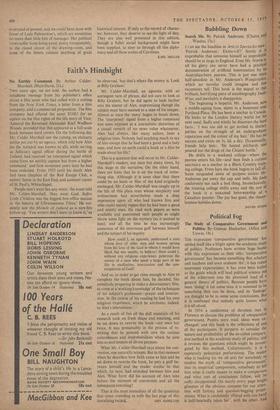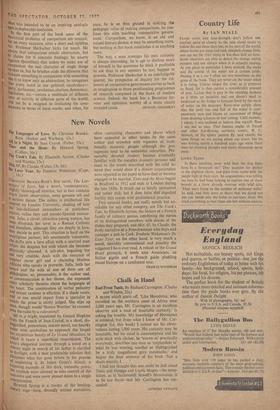Political Fog
THE expression 'comparative government' hl settled itself like a blight upon the academic stuc
of politics. Professors have written huge bool with this expression as their title; 'comparati‘ government' has become something that schola and teachers and even students 'do': it has raise enormous expectations; it has even been balk as the guide which will lead political science oi of the wilderness into the promised land of general theory of politics. Because people ha been 'doing' it for some time it is assumed to t something that can be done, and its 'finding are thought to be in some sense conclusions. Bt it is confessed that nobody quite knows whi it is all about.
In 1954 a conference of devotees met i Florence to discuss the problems of comparativ government. Papers were read, ideas were e, changed; and this book is the reflections of one of the participants. It purports to consider the nature and profitability of the so-called compara- tive method in the academic study of politics, and it reviews the questions which might be invest" gated by this method. Unfortunately, it is a supremely pedestrian performance. The reader who is looking (as we all are) for somebody to resolve the myth of 'comparative government into its empirical components, somebody to tell him what it really means to make a comparison and what sort of conclusions follow, will he sadly disappointed. On nearly every page brie t glimpses of the obvious compete for our atten- tion with fantasy and question-begging propc- sitions. What is confidently offered with one hand is half-heartedly taken bat -- with the other. And C What, was intended to be an inspiring apologia ends in deplorable confusion. /ri the first part of the book some of the theoretical problems of comparison are noticed; but on every occasion, after a short and styleless run,. Professor Heckscher kicks for touch. He admits that comparison entails abstraction, but he claims for it concrete findings; he asserts (against Quintilian) that unless we make use of Comparison the real character of single things escapes us, but he brushes aside the dilemma that to know something in comparison with something else is to know only an abstraction; he recognises that every word in our political vocabulary— Party, parliament, revolution, election, democracy, legislation, etc.—covers a multitude of different sorts of activity in different parts of the world, and yet he is resigned to instituting his corn- Prisons in in terms of these words; and when, for once, he is on firm ground in noticing the pedagogic value of making comparisons, he con- fuses this with teaching 'comparative govern- ment.' Comparison, we know, is an old and valued literary device; it may be something more, but nothing in this book establishes it as anything more.
The way a man manages his own curiosity is always interesting; he is apt to disclose more of himself in the questions he think it profitable to ask than in any answers he may happen to provide. Professor Heckscher is an indefatigable querist; his prospectus of inquiry for the fol- lowers of comparative government carries us back in imaginatioa to those proliferating programmes of research composed in the dawn of modern science. Indeed, the book has a Baconian fer- vour and optimism worthy of a more clearly



































 Previous page
Previous page